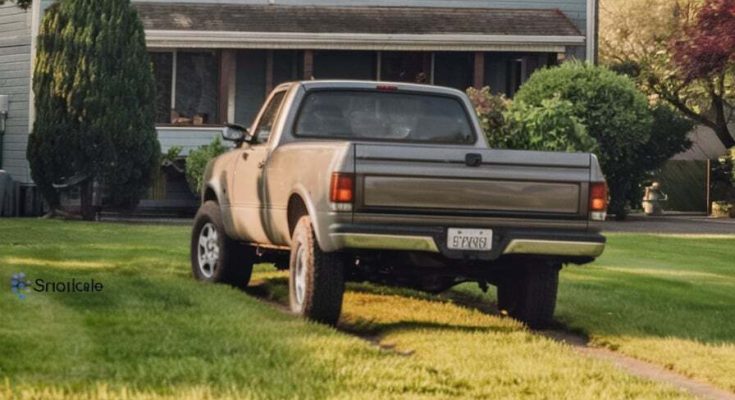When the new neighbors started parking their truck on Edna’s meticulously maintained lawn, they likely assumed the elderly widow would quietly accept the intrusion. However, fiercely protective of the home she and her late husband had lovingly cared for, Edna was determined not to let them encroach without a fight.
“I’ve lived in this house for over fifty years,” Edna said, reflecting on the countless memories tied to every corner of it. Her late husband, Harold, had planted the trees, trimmed the hedges, and ensured their little slice of paradise was always perfect. The house wasn’t just a building; it was a sanctuary filled with the life they had built together.
Even now, Edna’s son, Tom, visited regularly to help with the lawn and gutters. “You shouldn’t have to worry about this stuff, Mom,” he would say, his tone gentle yet firm. Though she appreciated his help, she didn’t want to burden him with her concerns.
Since Harold’s passing, the house had been a place of comforting silence. But that peace was disrupted when a young couple moved in next door, bringing a new kind of noise to the neighborhood. Edna, having seen many neighbors come and go over the years, initially didn’t mind. But these new neighbors were different.
One morning, while enjoying her tea by the window, Edna saw something that made her heart sink: a large pickup truck was parked right in the middle of her pristine lawn, leaving deep tire marks on the grass Harold had so lovingly tended.
Grabbing her cane, Edna hobbled outside, her heart pounding with a mix of anger and disbelief. The wife of the new neighbors emerged from the house, her demeanor dismissive and arrogant.
“Excuse me,” Edna said, trying to keep her voice steady. “Your truck is on my lawn. Could you please move it?”
The woman barely glanced at her. “We have three cars and only two spaces. You don’t have a car, so what’s the harm?”
Edna’s jaw tightened. “The harm is that this is my lawn. I take pride in it. Please move your truck.”
With a dismissive shrug, the woman replied, “I’ll tell my husband,” and turned away without another word.
Frustrated, Edna returned inside, hoping it was a one-time occurrence. But the next day, the truck was back, leaving fresh marks on the lawn. Determined to be firmer, Edna knocked on their door. This time, the husband answered—a large man with a permanent scowl.
“Your truck is on my lawn again,” Edna said, trying to keep her voice steady.
The man looked down at her, clearly annoyed. “We’ll park where we need to,” he said gruffly. “You’re alone and don’t have a car. What difference does it make?”
“It makes a difference to me,” Edna replied, her voice shaking with anger. “This is my property, and you have no right to use it.”
The man grunted and slammed the door in her face.
That night, as Edna lay in bed, she decided to take action. She wouldn’t burden Tom with this issue but was determined to protect her lawn as Harold would have wanted.
The next day, while searching the garage for a small rake, Edna spotted an old canister filled with small, sharp tacks. An idea began to form. That night, under cover of darkness, she sprinkled the tacks across the area where the truck usually parked. The tiny points glinted faintly in the moonlight, blending in with the grass.
The following morning, Edna heard the unmistakable sound of air hissing from tires. Looking out the window, she saw the neighbor’s truck sitting on four flat tires. A smile spread across her face as she watched the man’s face flush with confusion and anger.
The man, realizing what had happened, stormed over to Edna’s house, pounding on her door. “You did this, didn’t you? You’re going to pay for this!”
Edna kept her voice calm. “You parked on my lawn. I asked you to stop, and you ignored me. This is my property.”
The man’s anger escalated, but Edna was prepared. She had already called the police. As sirens approached, she stood her ground, while the man continued to rage.
When the police arrived, the man accused Edna of ruining his truck. The officer asked Edna to explain the situation. She described how she had repeatedly asked them to stop parking on her lawn, how they had ignored her, and how she had taken steps to protect her property.
The officers inspected the tire marks and tacks. “It looks like you’ve been parking on her lawn,” one officer said to the man. “That’s considered trespassing. She had every right to protect her property.”
The man’s expression fell as the officer continued. “You’ll be charged with harassment, trespassing, and property damage. I suggest you stay off her lawn from now on.”
The man, defeated, accepted the ticket and left. Edna watched as he walked away, relieved that her lawn would no longer be under threat.
In the days that followed, the neighbors kept their distance, and their truck never touched her lawn again. Edna took comfort in knowing she had defended her home and the memories it held.
Later, sitting on her porch with a cup of tea as the sun set, Edna felt a sense of peace. She had stood up for herself and for the home she and Harold had cherished.



